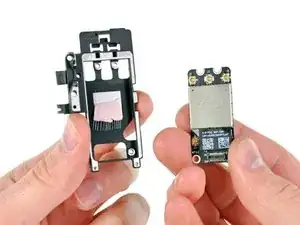Track down a number of hardware problems using the MacBook Pro 13" Unibody Troubleshooting Guide.
There are a number of components in the MacBook Pro 13" Unibody Late 2011 that can be cost effectively upgraded.
- Memory: The MacBook Pro 13" Unibody Late 2011 comes with 4 GB RAM standard, and accepts a maximum of 16 GB. If your MacBook Pro is still running with only the stock RAM, upgrading will provide a dramatic performance boost. You can upgrade to any combination of two 4 GB or 8 GB modules for 8, 12, or 16 GB of total RAM.
- Hard Drive: 500 or 750 GB hard drives came standard with the Late 2011 MacBook Pro 13" Unibody. You can easily upgrade the drive to 750 GB, 1 TB or a lightning-fast solid state drive. For a full list of available upgrade options, check out our selection of MacBook Pro 13" Unibody Late 2011 hard drives. Be advised, at the moment you need to use a piece of software to enable trim, called Trim Enabler—this involves some risk.
- Additional Storage: With the growing popularity of flash memory and cloud storage, you may find yourself rarely using the SuperDrive in your MacBook Pro. The optical drive can easily be replaced with a second hard drive or SSD using an optical bay hard drive enclosure. When installed, your additional hard drive will mount on your desktop just like an external hard drive.
- Battery: The battery is certainly replaceable, even though Apple doesn't consider it to be "user serviceable." Unscrew twelve screws, unplug the battery connector, and the battery can be removed!
The MacBook Pro 13" Unibody is clearly differentiated from other MacBook Pros by its smaller size. However, it does resemble its larger siblings, the MacBook Pro 15" Unibody and the MacBook Pro 17" Unibody.
Use the laptop identification system to help you identify your machine. MacBook Pros tend to look very similar, and it's important to know which machine you have before ordering any replacement parts.
The MacBook Pro was first introduced in January of 2006. Since then, Apple has fairly consistently released two new versions every year, each with improved specs and features than the one before.
Like all of their products, Apple says the MacBook Pro is not user-serviceable, but this laptop is fairly straightforward to take apart. It does have a lot of components smashed together very precisely, but getting to the components requires only some unscrewing.
- 13.3-inch (diagonal) LED-backlit glossy widescreen display with support for millions of colors
- 500GB or 750GB hard drive or 128GB, 256GB, or 512GB SSD
- 8x DVD/CD slot-loading SuperDrive
- 2.4GHz dual-core Intel Core i5 processor with 3MB shared L3 cache or 2.8GHz dual-core Intel Core i7 processor with 4MB shared L3 cache
- 4GB or 8GB of 1333MHz DDR3 memory
- 802.11n Wi-Fi wireless networking; IEEE 802.11a/b/g compatible
- Bluetooth 2.1 wireless technology
- Intel HD Graphics 3000 with 384MB of DDR3 SDRAM shared with main memory
- FaceTime HD camera
- Thunderbolt port
- MagSafe power port
- Gigabit Ethernet port
- FireWire 800 port (up to 800 Mbps)
- Two USB 2.0 ports (up to 480 Mbps)
- Thunderbolt port (up to 10 Gbps)
- Audio in/out
- SDXC card slot
- Kensington lock slot
- Stereo speakers with subwoofer
- Omnidirectional microphone
- Combined headphone/line in (supports digital output)
- Support for Apple iPhone headset with microphone
- Up to 7 hrs wireless web
- Built-in 63.5-watt-hour lithium-polymer battery
- 60W MagSafe Power Adapter with cable management system
- MagSafe power port
- MacBook Pro
- Display cleaning cloth
- 60W MagSafe Power Adapter, AC wall plug, and power cord
- Printed and electronic documentation
